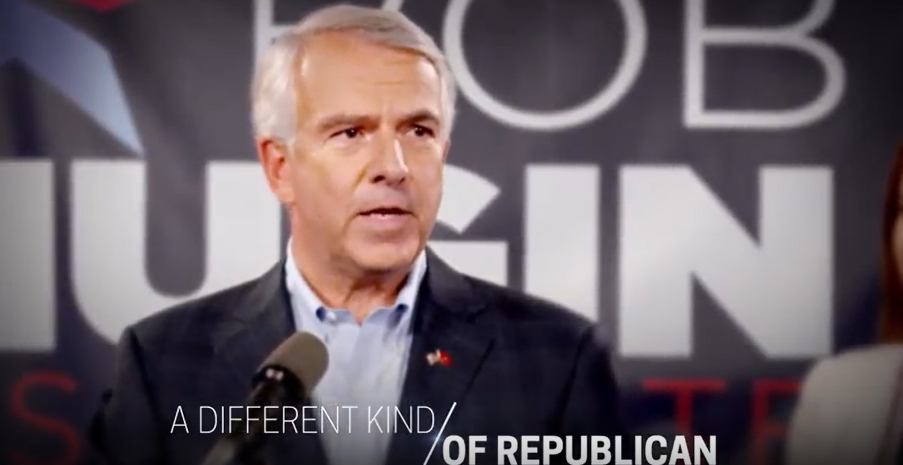Trump's Shadow Hovers Over the U.S. Senate Race

By CARL GOLDEN
A Republican candidate for United States Senate from New Jersey confronts history (President Richard Nixon led the ticket when the state last elected a Republican), a unified Democratic party, a voter registration deficit of 900,000, and a state party struggling to climb out of its financial hole and regain viability.
As if these were not obstacles enough, this year’s nominee, retired biopharmaceutical executive Bob Hugin, faces an extra burden imposed by the nagging of the Never Trumpers and the Ever Trumpers, elements in the party who seem to enjoy quarrelling in public over how Hugin should deal with the president.
Those with a visceral dislike of Trump have transferred their anger to Hugin over his generous past support for the president while an equally vocal bloc has insisted that success is achievable only if he fully embraces the president and his policies.
In addition to their built-in advantages, Democrats have no such distractions, even though their candidate, Sen. Robert Menendez, spent two months last year in a Federal courtroom defending himself against corruption charges and later was “severely admonished” by the Senate Ethics Committee for “bringing discredit on the Senate” by, in effect, selling his office for campaign contributions, vacations, plane rides, and assorted other gifts.
Democrats shrugged it all off as if it was of no moment and, if any among them had doubts or misgivings, they managed to hide their feelings well as they participated in “We’re With Bobby” celebrations and rallies around the state.
Democrats understand very well how to spell November ---- W-I-N.
Hugin, retired as executive chairman of the pharmaceutical firm Celgene, has committed to self-finance, willing to spend millions of his own money on his campaign, believing that voters will find Menendez’ recent history of ethical misconduct so offensive they’re willing to turn him out of office, doling out punishment he escaped when a jury was unable to agree on a verdict in his trial.
The Hugin campaign was encouraged and the Menendez campaign concerned with the results of the Democratic primary in which nearly four in 10 voters chose a candidate who raised no money, didn’t campaign but who wasn’t named Menendez.
Both campaigns should remain clear-eyed, however, about the results and avoid reading more into them than is realistic. Of the 157,000 who voted for Lisa McCormick, some will gravitate to Hugin, others will stay home or simply fail to vote for a Senate candidate and still others will hold their noses and return home to the Democratic Party. It was simply an expression they were offended by Menendez’ conduct and made known their anger by refusing to support him, in essence delivering a decision which eluded the jury. In any case, it is unlikely they will be the determining factor in November.
Trump’s shadow hovers over the race as it does over every other campaign in the mid-term elections, leaving candidates to handle it individually in ways they see most beneficial.
Hugin obviously cannot conceal or deny his past support for Trump. While the president’s approval rating has crept up nationally to the mid-40’s, he remains highly unpopular in New Jersey and will cast a shadow over Hugin’s candidacy. How deep and dark that shadow will be is unclear, but its presence is not.
In a Stockton Polling Institute survey this spring, for instance, 63 percent of respondents expressed a somewhat or very unfavorable impression of Trump and nearly 70 percent rated his performance in office as fair or poor.
The latest Hugin campaign television advertisement portrays him as pro-choice, a supporter of marriage equality, and in favor of equal pay for equal work.
Predictably the Trump base responded with hair-on-fire fervor, arguing that he will pay a dear price for such a public break with the President, risking a dramatic loss of support among Republicans whose commitment to Trump’s policies and agenda makes no room for ideological heretics.
It is doubtful that Hugin’s embrace of moderate positions on these social issues will gain him very much favor among those whose animosity for Trump runs so deeply that the sins of his prior support overshadow all else. His positions are a foxhole conversion, they believe, and are not genuinely held beliefs.
There’s no doubt that the Hugin campaign strategy as personified in this TV ad involves a reach to the ideological middle, that territory which has historically been where statewide elections are ultimately decided.
His past support for Trump will certainly be an issue, just as Menendez’ ethical misbehavior will be exploited and used to demonstrate an unfitness for office.
Hugin’s record as head of Celgene has already come under attack by Menendez who has accused him of profiting handsomely from the deliberately inflated cost of a drug effective against some cancers.
It will be left to New Jersey voters, of course, to sort all of this out, try to make sense of the charges and counter-charges, and weigh the merits and faults of each.
The Republican Party divide over the most effective approach to Trump, though, will certainly play a role. Hugin will strive to establish himself as his own man, an independent thinker whose policy positions will be based solely on the long term good of the country.
It remains a steep hill to climb, as his predecessor candidates learned, and it is more so for Hugin who must scale that slope weighted down by a backpack loaded with criticisms from dueling Trump factions.
Should Hugin be defeated, the Never Trumpers and the Ever Trumpers will see the loss as a validation of their positions.
In the meantime, an individual deemed by his colleagues to have brought discredit on the Senate will be sworn in to another term.
What’s that about reaping what you sow?
Carl Golden is a senior contributing analyst with the William J. Hughes Center for Public Policy at Stockton University.





